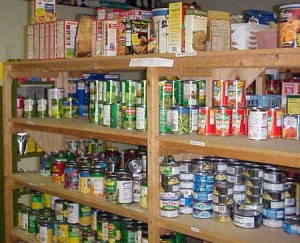Outreach: Implementing Service Projects
Service and the Mission of the Church

We live out the mission of word by reading Scripture and spreading the Good News of Jesus Christ.
We carry out the mission of worship as we participate in liturgies and communal prayer.
We live out the mission of service as we serve one another and the Church.
Take time to teach young people about the mission of the Church and our long history of Catholic social teaching. As you do this, you will help them understand that service is not an extracurricular activity, but a way of living our faith.
At Baptism, we are baptized into the common priesthood. And by virtue of our baptism, we are called to carry out the ministries if Jesus Christ in the world today. Service is essential to this call.
Now as we come to Confirmation, we celebrate the action of the Holy Spirit in our lives. We also recognize that each of us is blessed with the gifts of the Holy Spirit. This is a crucial time to help young people discern how they might put their gifts to use serving their parish, their community or the world.
Before you Begin
As you begin to implement service projects with young people, you will want to give adequate time and attention to choosing a project:
• Keep in mind the ages of the youth with whom you are working. Be sure that the project is developmentally appropriate for the group. Ask yourself if the children are physically, mentally and socially capable.
• Choose projects that work well with a group of young people. Serving in community with others is always beneficial. A group can tackle a large project in little time. In addition, the young people may draw courage from their peers when they find themselves in unfamiliar settings. Most importantly, working together will help build community and friendships among the group members.
• Try to choose projects that vary in their circle of influence. For example, if one project serves the parish, perhaps the next project could serve people in another country. Help young people understand that they can serve people in their families, their parish, their neighborhoods, their communities, around their country, and in other countries.
Preparation and Debriefing with Young People
Be sure to take time to both prepare young people for a project and debrief afterward. Here are some simple suggestions.
Preparation:
1. Tell the children about the people they will be serving.
2. Help youth see what the needs are of those they serve. Be sure that the purpose of the project is well defined.
3. Provide an opportunity for the young people to share what they hope for and what they may be concerned about.
4. Make your expectations clear. Include your expectations regarding attire and behavior.
5. If appropriate, make the agency’s expectations clear.
Debriefing :
1. Ask young people what they learned about the people the served.
2. Ask youth what they learned about themselves.
3. Give young people the opportunity to talk about how they felt while they were doing the project. Were they nervous? Did they become more comfortable? Did they have a good time?
4. Ask the children to explain how they feel they made a difference in the lives of the people they served.
5. Ask young people what worked well.
6. Ask youth to share what did not work or what may have been frustrating. Give them a chance to share suggestions.
7. If appropriate, provide an opportunity for the young people to share stories about their service experience with their families and the parish community.

• Do be aware of confidentiality. You need to protect both the young people and the people you serve.
• Do involve young people in the decision-making process as you choose service projects.
• Do offer the same opportunities to both boys and girls. Don’t discriminate.
• Do be sure that all volunteers will be utilized. Don’t have some kids simply watching while others are busy serving.
• Do help young people recognize that when they serve, they also receive.
• Do discourage unnecessary complaints. Both positive and negative attitudes are contagious. Help young people understand that it is a privilege to have an opportunity to share their gifts with others.
• Do discourage youth from judging those they serve. Compassion involves putting ourselves in someone else’s place and understanding their circumstances. We are called to serve with compassion, not judge.
• Don’t make service a requirement to be completed outside of program time. Instead, integrate service into the program so that young people can learn about the importance of service. Then invite and inspire young people to get more involved in living their faith in service to others.
• Do keep in mind that although service is integral to the mission of the Church, it is not required of candidates in order to receive the sacraments. Remember that Confirmation is a Sacrament of Initiation, a new beginning celebrating our life-long call to live our faith. Rather than requiring service before confirmation, focus on fostering a life of service.
• Do avoid projects that are simply “busy work” with no real affect.
• Don’t allow people to take advantage of young people. Do not let your youth get involved in a project so horrendous that no one else would do it.
Finally, encourage the young people to get involved. Help them understand that each of us plays an essential role in our Church. We cannot stand around and point out to people what needs to be done. Help young people understand that if we don’t do it, it won’t get done!
Reaching Out to the Elderly
• Arrange to lead Bingo at a nursing home, senior center, or senior housing complex. Bring healthy treats or dimes for prizes. Be sure to speak loudly and clearly while calling the game. Have a few young people at each table to assist the players. Or play games like cards, checkers, or chess to provide a one-on-one opportunity to get to know the seniors.
• Arrange to visit a senior facility to sing to and with the people. Learn some songs from when the seniors were young; they will love to sing them. If your youth group has accomplished musicians, have them accompany the singers.
• Build bird feeders and bird houses for seniors to hang in their yards. Find a parish member who can teach young people how to make a bird house or feeder from a simple pattern. Explain the project to a local building supply store and request material donations.
• Interview long-time members of the parish and put together a booklet or DVD of their stories and recollections. Make copies and share it with the whole community.
• Host a “senior prom.” Decorate, serve healthy treats, and play music from your guests’ era. Dance with those who can, and encourage everyone to move to the music. Be sure that the hosts and hostesses dress well for this special occasion.Reaching Out in Your Parish
• Help with church mailings and other large, labor intensive projects. Folding, stuffing, labeling, and stamping a bulk mailing can be an overwhelming task for one person alone. Or it can become a time to visit and listen to music for a group. Catch up with friends and help the church at the same time!
• Take responsibility for all the hospitality ministries at Mass. Sign up to serve as greeters and ushers at one Mass a month. As children get older, they may prefer to serve in these ministries with their peers rather than with their families.
• Make publicity posters for parish events. Kids are often more creative than many adults. Share those creative talents and publicize church events.
• Offer to clean the church. Keeping the church tidy inside and out is a big job. Many hands make work quick and fun. Besides, the church belongs to us, the parish members. It is up to us to take care of our church.
• Set up ministry mentors. Give kids an opportunity to find out more about a ministry before making a commitment. Ask volunteers to mentor young people who are interested in getting more involved. Kids can shadow volunteer ministers or find out what people find most rewarding about their ministry.
Reaching Out to the Poor
• Organize a shoe and sock collection. People on the street suffer severely from foot problems. It is nearly impossible for the homeless to keep their feet clean and dry. Shelters often provide foot baths. However, clean socks and shoes are always in demand.
• Arrange to work at a food shelf. Donations need to be gathered from area drop boxes and organized at the agency. Food also needs to be parceled for distribution. If you do not have a local food shelf in your area, volunteer at a food bank. Second Harvest is a national food bank network. Each bank needs volunteers to divide huge quantities of food into smaller portions to be given to those in need. Once the food is divided, a variety of foods need to be packaged for people to pick up. To find the Second Harvest nearest you call 1-800-532-FOOD or go to their website at www.secondharvest.org.
• Arrange to visit a shelter. If possible, talk to the guests, listen to their stories, and offer to play cards. Staff at the shelter can offer tips on preparing for the visit and interacting with guests.
• Organize a coat and mitten collection. Fall and Christmas are good times to hold these drives. Many children outgrow their winter clothes each year or replace them at Christmas time. Attach mittens and gloves to keep pairs together.
• Arrange to serve a meal at a shelter. Some shelters provide the food for you to prepare and serve, while other shelters may ask you to furnish the food. Check with the shelter to find out their volunteer requirements, such as age, adult/child ratio, attire, and food preparation regulations.
Reaching Out to Children
• Make birthday boxes. Help children in poverty celebrate their birthdays. Collect cake mixes, frostings, candles, and small toys or books. Decorate bakery cake boxes and fill with birthday items. Be sure that toys are appropriate for both boys and girls. Also, keep all ages in mind. Distribute the Birthday Boxes to shelters and food shelves.
• Organize a children’s book collection. Donate the books to shelters, food shelves, or churches and schools.
• Make special treats for children at food shelves or shelters. Make candy treat bags or decorate cookies and cupcakes. These kinds of treats are a rare contribution for children in poverty. The treats will be appreciated and will help the children know that others care for them.
• Organize a collection and make baby care kits for shelters. Collect items for baby care-packages. Items could include formula, diapers, wipes, wash cloths, and baby bath soap. Distribute the care-packages to shelters and food shelves.
• Arrange to host a party or picnic for children living in a shelter or transitional housing facility. Plan games and activities. Provide and serve special treats.
